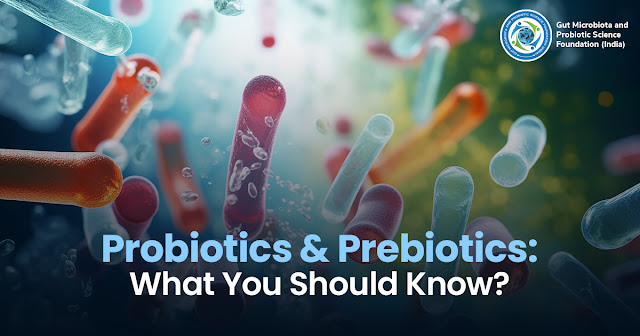Probiotics And Prebiotics: What You Should Know?
 |
Probiotics And Prebiotics: What You Should Know? |
Understand the Basics: What Are Probiotics and Prebiotics?
Probiotics
Think of probiotics as the superheroes of your gut! These are live microorganisms, primarily bacteria and some yeasts, that confer numerous health benefits when consumed in adequate amounts. They work their magic by maintaining a healthy balance of gut flora, aiding digestion, and supporting immune function.
Prebiotics
Now, prebiotics are the unsung heroes that fuel the probiotics! They are non-digestible fibers that serve as food for the beneficial bacteria living in your gut. Essentially, prebiotics act as fertilizers, stimulating the growth and activity of probiotics, thus promoting a thriving gut ecosystem.
4 Incredible Benefits of Probiotics and Prebiotics
1. Improved Digestive Health
Probiotics help keep your digestive system running smoothly by restoring balance and preventing common gastrointestinal issues like bloating, constipation, and diarrhea. Meanwhile, prebiotics provide the necessary nourishment for probiotics to flourish, ensuring optimal gut function.
2. Enhanced Immune Function
Did you know that about 70% of your immune system resides in your gut? By supporting a diverse and robust gut microbiome, probiotics and prebiotics are crucial in bolstering your body's defenses against infections and diseases.
3. Mood Regulation
Believe it or not, your gut and brain are in constant communication through what's known as the gut-brain axis. Probiotics have been shown to influence neurotransmitter production, potentially alleviating symptoms of anxiety, depression, and stress.
4. Weight Management
Maintaining a healthy weight isn't just about diet and exercise; it's also about the health of your gut. Probiotics may help regulate appetite, reduce inflammation, and even prevent weight gain by promoting the breakdown of fats and the absorption of nutrients.
Incorporating Probiotics Into Your Diet
Now that we've covered the fundamentals let's talk about practical ways to introduce probiotics into your daily routine. From delicious foods to convenient supplements,
There are plenty of options to choose from:
- Probiotic-Rich Foods
Nature's bounty is filled with probiotic treasures! Incorporate fermented foods like yogurt, kefir, sauerkraut, kimchi, and kombucha into your diet for a flavorful dose of beneficial bacteria.
- Natural Probiotic Foods
Don't forget about the plant-based options! Certain fruits and vegetables, such as bananas, garlic, onions, asparagus, and leeks, contain prebiotic fibers that support the growth of probiotics in your gut.
- Probiotic Supplements
For those on the go or looking for an extra boost, probiotic supplements come in handy. Look for high-quality probiotic capsules, powders, or chewable containing diverse bacterial strains, and follow the recommended dosage guidelines.
Incorporating the Power of Prebiotics
Now, let's shine the spotlight on prebiotics and explore how you can incorporate these gut-nourishing fibers into your meals:
- Whole Grains
Swap refined grains for whole grains like oats, barley, quinoa, and brown rice, which are rich in prebiotic fibers and provide sustained energy throughout the day.
- Leafy Greens
Load up on leafy greens such as spinach, kale, arugula, and Swiss chard, which are not only packed with vitamins and minerals but also contain ample amounts of prebiotics to support gut health.
- Fruits and Vegetables
Keep your produce drawer stocked with a colorful array of fruits and vegetables, including apples, berries, oranges, broccoli, carrots, and artichokes, all of which are excellent sources of prebiotic goodness.
- Legumes
Beans, lentils, chickpeas, and peas are not only budget-friendly pantry staples but also rich sources of prebiotic fibers that promote satiety and digestive health.
4 Useful Tips for Optimal Gut Health
To maximize the benefits of probiotics and prebiotics, consider these additional tips:
1. Diversify Your Diet
Aim for variety by incorporating a wide range of probiotic and prebiotic foods into your meals to ensure a diverse gut microbiome.
2. Limit Sugar and Processed Foods
High-sugar and processed foods can disrupt the balance of bacteria in your gut, so minimize their intake and opt for whole, nutrient-rich foods instead.
3. Stay Hydrated
Water is essential for proper digestion and absorption of nutrients, so be sure to drink plenty of fluids throughout the day to support your gut health.
4. Manage Stress
Chronic stress can wreak havoc on your gut microbiota, so practice stress-reducing techniques like mindfulness, yoga, meditation, or deep breathing to keep your gut happy and healthy.
The Bottom Line
Incorporating probiotics and prebiotics into your diet isn't just a trend—it's a lifestyle choice that can have a profound impact on your overall health and well-being. By nourishing your gut with these beneficial bacteria and fibers, you're not only supporting digestion but also fortifying your immune system, regulating your mood, and promoting a healthy weight.
So, whether you're sipping on a tangy kombucha, savoring a crunchy apple, or sprinkling probiotic powder into your morning smoothie, remember that every bite and sip is a step toward a happier, healthier gut. Here's to thriving gut health and a vibrant life ahead! Cheers!
For more information: Gut Foundation
Also, Visit here: How to Improve Gut Health & Reduce Inflammation



Comments
Post a Comment